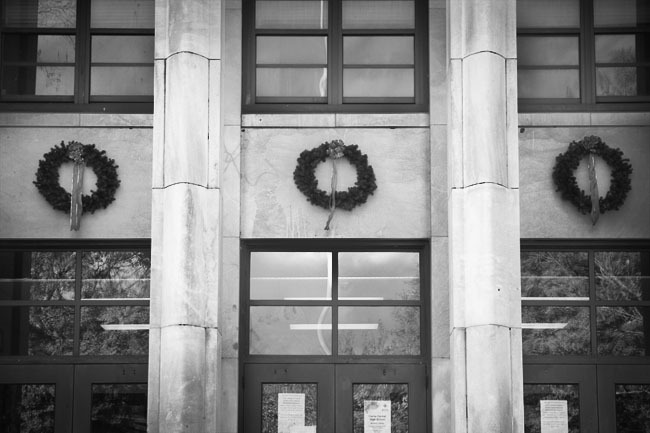By AARON HOLMES – Junior Copy Editor
When students returned to Clarke Central High School from Thanksgiving break on Nov. 26, a transformation had occurred. The school’s brick façade was decorated with wreaths and ribbons, and further plans were announced to place a small pine tree in the main lobby.
“Our decorations are pretty simple. We always put up wreaths around the school,” CCHS Assistant Principal Dr. Sheila Dunham said. “And we have a Christmas tree in the front lobby, or, rather, a holiday tree. It’s not just for Christmas.”
The First Amendment of the U. S. constitution states that the government will “make no law respecting an establishment of religion, or the free exercise thereof.” Students, therefore, have the right to celebrate any religious holiday in schools, as long as the school does not establish this celebration as mandatory.
However, CCHS sophomore Anna Grossman believes that the school’s choice of decoration is unfair, and establishes a celebration of one holiday in particular.
“They think that by calling it a holiday tree, it then involves everyone, but it doesn’t,” Grossman said. “When you see those decorations, you’re bombarded with a certain religion. You’re constantly reminded that you’re not a part of it.”
Grossman feels the only way to ensure an absence of religion is to ban holiday celebrations in schools altogether.
“They should leave Christmas completely out of school. They should leave all holidays out,” Grossman said. “I’m not saying we should celebrate Hanukah; that would be totally wrong. Religions should stay at home.”
Other students, such as CCHS sophomore Cassie Tye, see value in celebrating the holidays in school, as long as moderation is present.
“Everyone has a right to their own religion. If somebody wants to come in and celebrate Christmas, let them,” Tye said. “Just don’t throw (religious beliefs) on everybody else.”
Tye also sees no issue with Christmas-themed decorations in schools. She believes having such decorations does not necessarily discriminate against any religious or groups.
“(Christmas) isn’t necessarily a religious holiday. I know people who go to Christmas celebrations who don’t even celebrate that religion,” Tye said.
In past years, public schools across the country were subjects of debates relating to the celebration of Christmas.
According to a report by the Columbia Broadcasting Corporation, Larry Harrison, a Midlands, S.C. pastor, and his family denounced the local school district in 2011. Harrison claimed that Christmas greetings and Christmas decorations were not welcome in schools, despite refutations by the school board.
Holiday celebration in public schools has also been a topic for politicking on the national stage. In a video uploaded to YouTube last winter, then presidential candidate Rick Perry (R-Texas) said there was “something wrong in this country” when children couldn’t “openly celebrate Christmas in schools.”
However, according to Dunham, students and staff are guaranteed freedom to celebrate religious holidays at public schools such as CCHS.
“If anyone has ever said, ‘You can’t say Merry Christmas,’ I haven’t heard of it,” Dunham said. “However, people should think about what other people celebrate, and that not everyone is celebrating the same holiday.”
Dunham also feels that the Christmas theme of holiday decorations is not typically a topic of major controversy at CCHS.
“They do look pretty Christmas-y, a lot of my clothes are red and green in December,” Dunham said. “I’m not trying to put Christian beliefs out there; it’s just fun and festive. Most people aren’t offended by that.”
While a variety of opinions exist today with regard to holiday celebrations, according to Dunham this diversity was a large shift from her own childhood.
“Over years, what we call the holidays has changed. When I was growing up, everybody said, ‘It’s time for Christmas break.’ Now, most people talk about winter break. I don’t have a problem with winter break, but I also don’t have a problem if somebody says Merry Christmas or Happy Holidays.”
While Dunham considers most people in CCHS to be sensitive about religions while celebrating holidays, the CCHS administration has no set guidelines in regard to school decorations.
“Administration hasn’t told people to (not put up decorations),” Dunham said. “I think people are just very aware of different cultures. Not everyone’s beliefs and backgrounds and ethnicities are the same.”
For many teachers, the holiday season and its festivities can serve as an opportunity to expand students’ cultural awareness. According to Dunham, various CCHS staff members make an effort to represent a wide range of religions in their classrooms.
“Teachers want to take the opportunity to teach people about other customs. It’s an excellent time of the year to do that; it’s really a teachable moment,” Dunham said.
CCHS English for Speakers of Other Languages teacher Jodi Bolgla agrees that the holiday season should serve as an opportunity to educate students about various religions.
“I think that CCHS could make its decorations more inclusive,” Bolgla said. “Now that we are moving toward the IB program, the school could make decorative billboards that reflect a variety of winter celebrations: Hanukah, Kwanzaa, Diwali, Los Pasadas and many more.”
CCHS junior Jennifer Hobby sees similar benefits of holiday celebrations, and also believes that they can serve as an opportunity to display the school’s cultural range.
“In Clarke Central, we’re diverse,” Hobby said. “If we’re going to celebrate something, it should be the diversity of ethnicity and religion we have here.”
